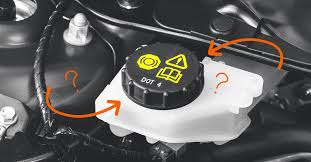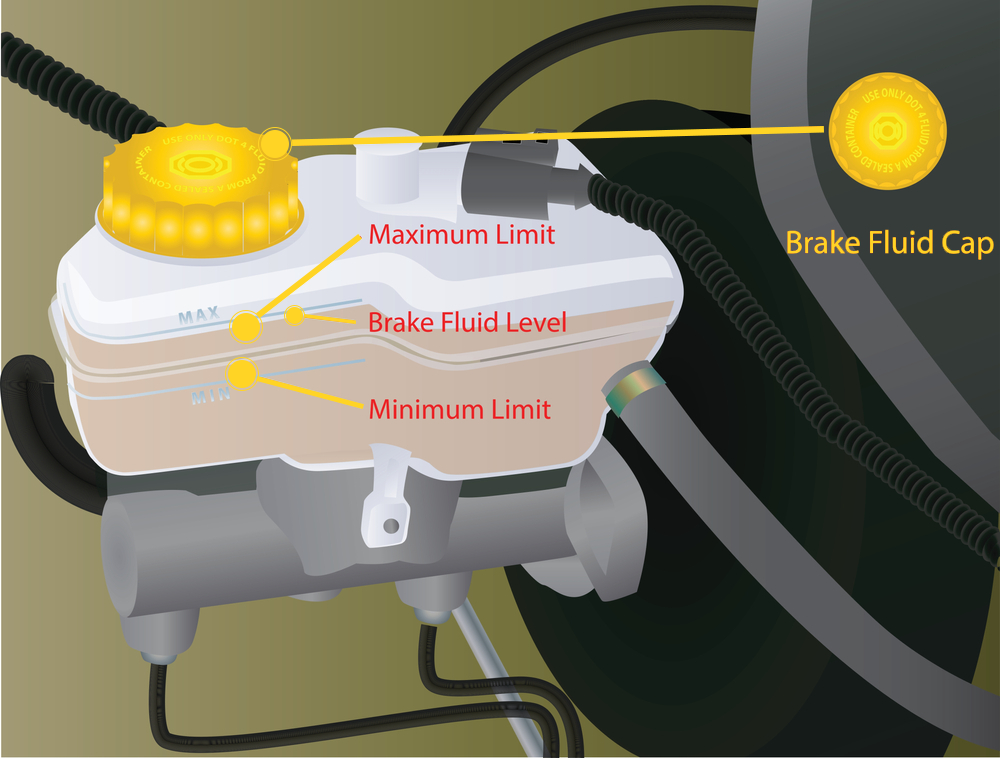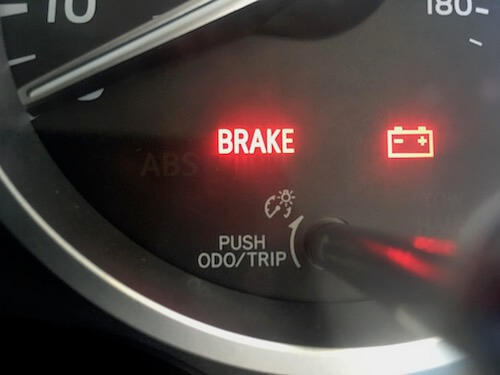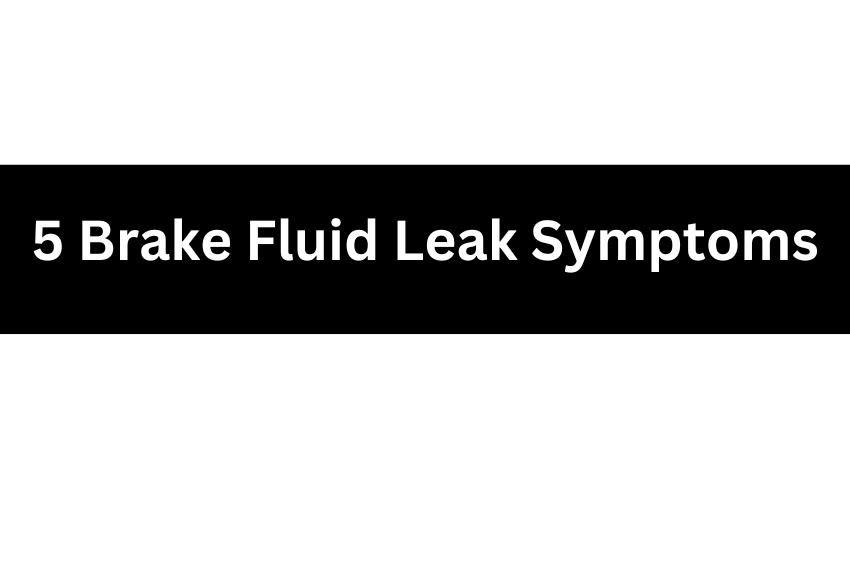A brake fluid leak is a dangerous condition that occurs when brake fluid escapes from the braking system.
This can lead to reduced braking performance, increased stopping distances, and potentially complete brake failure, which can result in serious accidents.
However, In this guide, you’ll learn about the symptoms of brake fluid leak, including how you can diagnose, and prevent It.
Read Also: Does Brake Fluid Leak When Car Is Off?
What Are The Common Signs Of A Brake Fluid Leak?
Here are five key symptoms that you may have a brake fluid leak
Low Brake Fluid Levels
Your car’s brake system relies on brake fluid to function properly.
This fluid helps transmit pressure from your brake pedal to the brake pads, which slows down your vehicle.
Low brake fluid levels can significantly compromise your car’s braking performance, putting you and others at risk.
Checking your brake fluid level is a simple task that can help prevent potential problems.
To do this, you’ll need to locate your brake fluid reservoir.

This is usually a small, clear plastic container located under the hood of your car.
Once you’ve found the reservoir, you’ll see markings indicating the minimum and maximum fluid levels.

Ensure that the fluid level is between these marks.
If the level is low, it’s necessary to address the issue promptly to avoid further complications.
Also, note that brake fluid can deteriorate over time.
If the fluid in your reservoir appears dark or cloudy, it may need to be replaced.
Using old or contaminated brake fluid can negatively impact your braking system’s performance.
If you also notice that your brake fluid level is consistently low, even after refilling the reservoir, you likely have a leak in your brake system.
A brake fluid leak can be dangerous and should be addressed by a qualified mechanic as soon as possible.
To prevent brake fluid leaks, have your brake system inspected regularly by a professional.
They can identify and repair any potential issues before they become serious problems.
Read Also: Symptoms Of Low Brake Fluid Level
Read Also: Brake Fluid Reservoir
Spongy Or Soft Brake Pedal

A spongy or soft brake pedal is a clear sign that something’s not right with your car’s braking system.
When you press the brake pedal, it feels soft and squishy instead of firm and responsive.
This can be a scary feeling, especially if you’re driving at high speeds or in heavy traffic.
One common cause of a spongy brake pedal is low brake fluid levels.
Brake fluid is essential for transmitting pressure from your foot to the brake pads, which slow down your car’s wheels.
If the fluid level is low, the brake pedal won’t feel as firm as it should.
Another possible cause is air in the brake lines.
Air can enter the brake lines during a brake job or if there’s a leak in the system.
When air is present, it can compress under pressure, making the brake pedal feel spongy.
Worn brake components, such as brake pads or rotors, can also contribute to a spongy brake pedal.
As these components wear down, they become less effective at stopping your car.
This can lead to a longer stopping distance and a less responsive brake pedal.
If you notice a spongy brake pedal, address the issue promptly.
Driving with a spongy brake pedal can be dangerous, as it may take longer to stop your car in an emergency.
Read Also: Leaking Brake Fluid Cost (2024 Guide)
Puddles Of Fluid Under The Vehicle
Discovering a puddle of fluid under your parked car can be a worrying sight.
Different fluids serve specific purposes in your vehicle, and a leak can indicate a serious problem.
The color of the fluid can often give you a clue about its source.
Engine oil is typically dark brown or black, while transmission fluid is usually red or pink.
Coolant can be green, yellow, or orange, and brake fluid is often clear or yellowish.
Power steering fluid is typically red or clear.
If you notice a fluid leak, take immediate action to prevent further damage.
Here’s what you should do:
- Avoid driving your car to prevent the leak from worsening.
- Determine the type of fluid leaking by its color and consistency.
- Consult a mechanic to diagnose the cause of the leak and perform necessary repairs.
Ignoring a fluid leak can lead to serious consequences.
For example, an engine oil leak can cause engine damage, a transmission fluid leak can affect your vehicle’s shifting performance, and a brake fluid leak can compromise your braking system’s effectiveness.
To prevent fluid leaks, have your vehicle regularly inspected by a professional mechanic.
They can identify and address any potential issues before they become serious problems.
Read Also: What Color Should My Brake Fluid Be? (Normal vs. Contaminated)
Illuminated Brake Warning Light
If your car’s brake warning light illuminates, it’s a clear sign that something is wrong with your braking system.
This light is typically a red circle with an exclamation point inside.

Seeing this light should be a cause for concern.
It’s a warning that your vehicle’s braking system may not be functioning properly.
Driving with a lit brake warning light is extremely dangerous and can lead to serious accidents.
One common cause of a brake warning light is low brake fluid levels.
As we’ve said, Brake fluid is essential for transmitting pressure from your foot to the brakes.
When the fluid level is low, the brakes won’t work as effectively, triggering the warning light.
Another possible cause is a faulty brake pad or rotor sensor.
These sensors monitor the wear of your brake pads and rotors.
If a sensor detects excessive wear, it will trigger the warning light.
However, If you see a lit brake warning light, find a safe place to park your vehicle avoid driving any further, and check the Brake Fluid Level.
As mentioned earlier, low brake fluid can cause the warning light to illuminate.
Check the fluid level in the reservoir and top it off if necessary.
Read Also: Brake Fluid Level Warning Light Explained
Decreased Braking Performance
If your car takes longer to stop than usual, it’s a sign of decreased braking performance.
This can be a scary situation, as it can increase your stopping distance and put you at risk of an accident.
Several factors can contribute to decreased braking performance.
One common cause is worn brake pads and rotors.
These components are responsible for slowing down your car, and as they wear down, their effectiveness diminishes.
Low brake fluid levels can also lead to decreased braking performance.
Warped rotors are another potential reason.
Warped rotors can cause your brake pedal to vibrate and can reduce your braking ability.
Here’s what you can do If you notice decreased braking performance
- Visually inspect the brake pads and rotors for wear. If they’re worn down, they’ll need to be replaced.
- Check the fluid level in the reservoir and top it off if necessary.
- If you feel vibrations in the brake pedal, it may indicate warped rotors.
Also, listen for Unusual Noises.
Squealing or grinding noises when braking can signal worn brake pads or other issues.
If you’re unable to identify the cause of the decreased braking performance, or if you’re unsure about how to fix it, it’s best to consult a qualified mechanic.
They can diagnose the problem and perform necessary repairs.
Read Also: Why Are My Brakes Grinding When I Stop?
